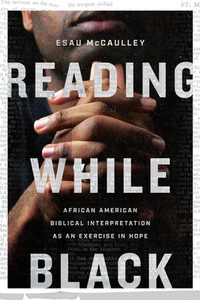Take a photo of a barcode or cover
236 reviews for:
Reading While Black: African American Biblical Interpretation as an Exercise in Hope
Esau McCaulley
236 reviews for:
Reading While Black: African American Biblical Interpretation as an Exercise in Hope
Esau McCaulley
Reading While Black opens the eyes of the African American Christian. It brings clarity to the knowledge that there is no way Christianity can be characterized as the “white mans religion.”
Esau McCaulley uses sound Bible doctrine to paint the narrative of Black ecclesial interpretation. From the Old Testament to the New Testament he utilizes the scriptures to enlighten his readers of the hope that can only be found in Christ Jesus. As we live in a world where the church remains segregated we need books like this to remind us that God chose a people that have been ostracized, enslaved, and not white to be His own. Race and ethnicity were the last thing on His mind when He created men in His image. Fellowship with said creation has always been at the forefront of His intentions.
I encourage those you you who are being ambushed with concerns that you aren’t black enough or that there are other religions that are culturally appropriate for African Americans to purchase this book, pull out your Bible, pray before reading, and understand the truth of where we began and how we got here.
Esau McCaulley uses sound Bible doctrine to paint the narrative of Black ecclesial interpretation. From the Old Testament to the New Testament he utilizes the scriptures to enlighten his readers of the hope that can only be found in Christ Jesus. As we live in a world where the church remains segregated we need books like this to remind us that God chose a people that have been ostracized, enslaved, and not white to be His own. Race and ethnicity were the last thing on His mind when He created men in His image. Fellowship with said creation has always been at the forefront of His intentions.
I encourage those you you who are being ambushed with concerns that you aren’t black enough or that there are other religions that are culturally appropriate for African Americans to purchase this book, pull out your Bible, pray before reading, and understand the truth of where we began and how we got here.
One of the best books I've read this year. Every single chapter shed fresh light on the Biblical text, sometimes in ways that made me shake my head, like, "how have I not seen that before?"
Except, we all know--or should know--the answer to that question. Because we've read so narrowly within our own traditions. This is part of what I've found so refreshing about reading more and more from the Black theological tradition, insights -- deep, true, meaty, nourishing, insights from the Biblical text, that I need for my own soul.
Also, as a Biblical scholar, Dr. McCaulley has the touch -- everything he touches is exegetical gold. Whether it's the Old Testament narrative of Joseph's two sons; or the historical setting of the Gospel of Luke and its author; or the way Black Christians approach the problem of evil; or the imprecatory psalms; or Paul! Dr. McCaulley sure knows his way around Paul. There isn't a wasted chapter in this book.
And then there's the "Bonus Track," a 400 year review of the Black theological tradition, which is a model of theological method, charitable engagement, and clarity. It should be read and re-read by anyone interested in doing or studying theology.
I plan to read everything by Dr. McCaulley that I can get my hands on (starting with [b:Sharing in the Son's Inheritance: Davidic Messianism and Paul's Worldwide Interpretation of the Abrahamic Land Promise in Galatians|43087997|Sharing in the Son's Inheritance Davidic Messianism and Paul's Worldwide Interpretation of the Abrahamic Land Promise in Galatians|Esau McCaulley|https://i.gr-assets.com/images/S/compressed.photo.goodreads.com/books/1544524404l/43087997._SX50_.jpg|66897257]). Highly recommended.
Except, we all know--or should know--the answer to that question. Because we've read so narrowly within our own traditions. This is part of what I've found so refreshing about reading more and more from the Black theological tradition, insights -- deep, true, meaty, nourishing, insights from the Biblical text, that I need for my own soul.
Also, as a Biblical scholar, Dr. McCaulley has the touch -- everything he touches is exegetical gold. Whether it's the Old Testament narrative of Joseph's two sons; or the historical setting of the Gospel of Luke and its author; or the way Black Christians approach the problem of evil; or the imprecatory psalms; or Paul! Dr. McCaulley sure knows his way around Paul. There isn't a wasted chapter in this book.
And then there's the "Bonus Track," a 400 year review of the Black theological tradition, which is a model of theological method, charitable engagement, and clarity. It should be read and re-read by anyone interested in doing or studying theology.
I plan to read everything by Dr. McCaulley that I can get my hands on (starting with [b:Sharing in the Son's Inheritance: Davidic Messianism and Paul's Worldwide Interpretation of the Abrahamic Land Promise in Galatians|43087997|Sharing in the Son's Inheritance Davidic Messianism and Paul's Worldwide Interpretation of the Abrahamic Land Promise in Galatians|Esau McCaulley|https://i.gr-assets.com/images/S/compressed.photo.goodreads.com/books/1544524404l/43087997._SX50_.jpg|66897257]). Highly recommended.
challenging
informative
inspiring
fast-paced
This book was worth the purchase after the second chapter, but it kept delivering. McCaulley goes after the “tough” Pauline passages, puts them in their context, and gives the reader hope. At many times in the book, he noted his intension was to answer certain questions, but I hope his future writing will go deeper.
This book is not long but it’s meaty. The author’s intended audience is African American Christians who are wondering if the Bible is an enemy or a friend in pursuit of justice. This book really made me think and examine Bible passages I’m familiar with but never thought more about after they were spoon fed to me. Be aware that the author makes it very clear he is making his case from a place of believing God as creator, liberator, savior and judge. All points come from believing this as truth. He even openly says others need to own up to their doubt and continue to pursue thought. I can’t recommend this book enough.
A truly excellent celebration of the Black exegetical tradition, one which takes the Scriptures seriously as liberative while also remaining alive to how the abuse of the Scriptures has led to the abuse of people. McCaulley plots a line that seeks to steer clear of traditional interpretations that support white supremacy, but also avoids the pitfalls of a liberal tradition (both Black and White) that denies the life and freedom-giving power of Scripture itself. He demonstrates this Black exegetical tradition through examining a Scriptural approach to the problem of policing, the legitimacy of protest, the reality of black rage, and the haunting spectre of slavery. In all of this McCaulley uses the text as the text, believing it to be both God's word and God's revelation of freedom and hope. McCaulley seeks to honour his ancestors who were present in the Scriptural story, and who saw the Bible as a testament to freedom when read and applied correctly.
challenging
emotional
hopeful
informative
reflective
fast-paced
Incredible book on Black Theology with specific systematicness laid out in light of the Black experience. Challenging for white readers which is so necessary as I navigate my own biases and continue to grow. Thankful for this!
Graphic: Genocide, Hate crime, Racial slurs, Racism, Slavery, Violence
While I don't personally agree with McCaulley's more traditional treatment of Scripture, I felt that he did a great job at explaining his perspective in a way that made me respect his views. I also have to say that it's rare to see someone with a traditional view also name and consider so many "opposing" viewpoints, like womanist and liberation theology. Chapter 7 on Freedom was the highlight for me, casting a wide and expansive (even utopian) vision of reality.
I read this with a group! Good decision to discern with other Christians how to grapple with the questions and answers Esau gives.



